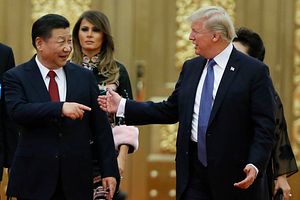A Chinese national identified as an operative for the Ministry of State Security (MSS), China’s main overseas intelligence and security agency, has been extradited to the United States from Belgium. Yanjun Xu was named on Wednesday by the U.S. Department of Justice after being charged with economic espionage. He is the first Chinese MSS agent to be extradited to the United States.
Xu, also identified by the aliases Qu Hui and Zhang Hui, is charged with “conspiring and attempting to commit economic espionage and steal trade secrets from multiple U.S. aviation and aerospace companies.” According to the unsealed criminal complaint against him, Xu “targeted certain companies inside and outside the United States that are recognized as leaders in the aviation field,” including General Electric (GE) Aviation.
The announcement of Xu’s extradition in an economic espionage case comes just days after U.S. Vice President Mike Pence gave a major speech outlining the Trump administration’s growing strategy of competition with China. In that speech, Pence charged China with overseeing the “wholesale theft of American technology.”
The announcement of the indictment against Xu comes at a time of sharply declining U.S.-China ties, amid an escalating trade war, brinkmanship in the South China Sea, a recently approved U.S. arms package for Taiwan, and recently implemented U.S. sanctions on an organ of the People’s Liberation Army.
“This indictment alleges that a Chinese intelligence officer sought to steal trade secrets and other sensitive information from an American company that leads the way in aerospace,” U.S. Assistant Attorney General Demers said in a statement.
“This case is not an isolated incident. It is part of an overall economic policy of developing China at American expense. We cannot tolerate a nation’s stealing our firepower and the fruits of our brainpower. We will not tolerate a nation that reaps what it does not sow,” Demers added.
“U.S. aerospace companies invest decades of time and billions of dollars in research. This is the American way. In contrast, according to the indictment, a Chinese intelligence officer tried to acquire that same, hard-earned innovation through theft,” Benjamin C. Glassmin, U.S. Attorney for the Southern District of Ohio, said in a statement.
“This case shows that federal law enforcement authorities can not only detect and disrupt such espionage, but can also catch its perpetrators. The defendant will now face trial in federal court in Cincinnati.”
Xu’s alleged activities in the U.S. aviation sector are described in the released indictment, including his interactions with unnamed co-conspirators.
The manner in which the case against Xu was built, leading up to his extradition, marks an important change from previous cases involving foreign nationals charged with economic espionage.
Xu will face trial in a U.S. federal court in Cincinnati, Ohio.

































